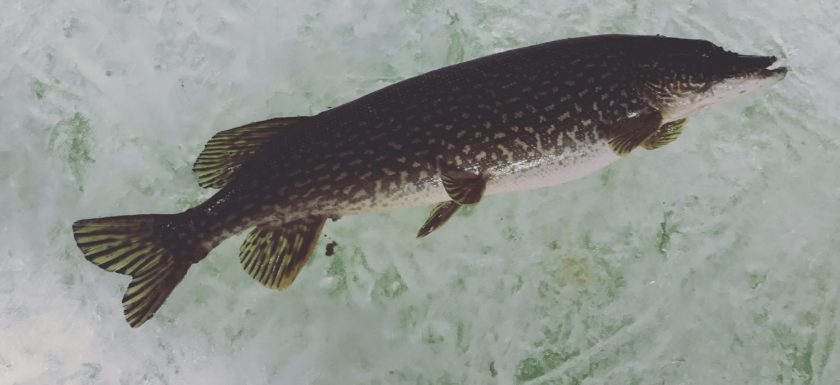
The winter of 2017/2018 was NOT a typical winter in upstate New York. A typical winter around here has become difficult to define. A traditional winter in the northeast is one in which lake ice forms in late December, grows thick in January and stays solid through February before beginning a slow decay as winter transitions into Spring. Here in central New York we experienced several days above 45 degrees in late January and a couple days above 50 degrees in February. Such warm temperatures were coupled with rain and had a big impact on ice conditions. On some lakes and bays ice went from safe and solid to questionable in a few days time! Ice anglers in the region were enjoying good ice fishing one day then unable to get on the ice the next day.
The lingering thaw in February was severe but it did not melt the 18 to 20 inch layer of ice covering the bulk of the lakes’ surface. It did, however, create snowmelt and surface water run-off that ruined the ice along the shoreline of the lakes. Narrow areas of open water limited access to the ice and kept ice anglers home. In some places ice anglers were able to access ice after the record-breaking thaw, but for most, it was a sign to put ice gear away.
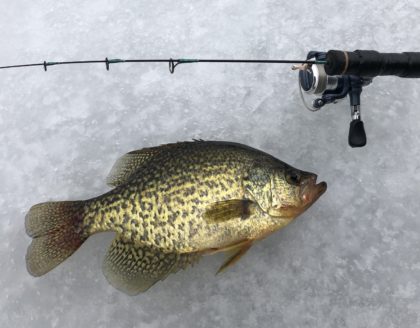
As the days grow longer in winter some species of fish become more aggressive. Species targeted by ice anglers, like black crappie and smelt, are often nocturnal or low-light feeders. Yet these species become more diurnal as the photoperiod lengthens. Schooling fish, like yellow perch, start to move from vast open lake basins (where they can be difficult to find) into shallow weedy bays in preparation to spawn. The metabolism and mood of fish changes as the increasing daylight triggers spawning instincts. Ice anglers anticipate these changes in panfish behavior when late ice season arrives in upstate New York. When safe ice exists on the lakes at that time, experienced ice anglers are often rewarded with good catches of panfish.
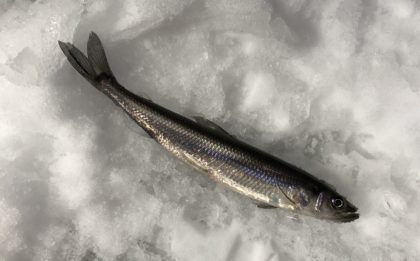
When the ice that clings to the shoreline melts from repeated thaw it is a sure indicator that it is late-ice season! It is then that the bulk of ice anglers will declare that ice fishing is over. Outdoor writers and bloggers will announce that ice fishing is now unsafe. The problem with outdoor writers and bloggers is that they spend most of their time at a desk staring at a computer and have little or no idea what the actual conditions are at present. Accurate ice reports (or any report on fishing conditions) can be ascertained by calling a local bait shop or a local guide.
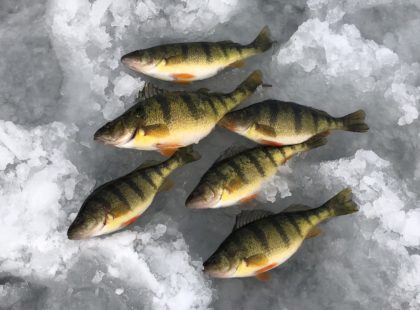
If the ice is still safe the experienced ice angler knows it as he or she has been traveling upon it regularly and drilling holes through it for weeks. It takes more than a few days to melt 20 inches or more of ice on a lake or a bay. Late-ice is when the experienced ice angler can enjoy very good fishing with little competition. During late season conditions the ice angler must use caution. Just as at any other time of the ice fishing season. It is always wise to employ a spud (a long handled steel rod with a narrow bladed head on one end) to prod and poke the ice surface as it is traversed. The thickness of the ice may allow for safe walking but a recent thaw will open up old and eroded fishing holes that have widened large enough for someone to fall through. These spots are apparent most of the time but if they freeze and crust over fresh snow can hide them. Using a spud allows the ice angler to avoid such hazards by whacking the ice repeatedly as they walk over it to be certain their next step is a safe one.
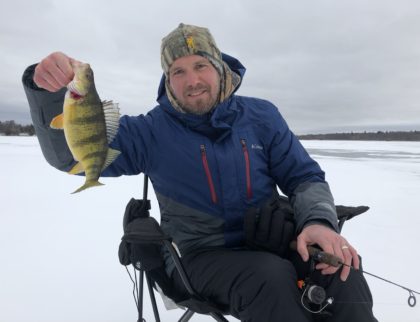
Several times I have used planks to bridge the gap between shore and thick lake ice to go and catch fish. And minus a wet foot once or twice, I never had any incidents that were unsafe. But I would never lead anyone onto the ice over a plank. Late ice is not synonymous with unsafe ice as many who are unacquainted would lead you to believe. Needless to say, no fish is worth risking ones life for and safety always trumps any move I make. On the ice or off.
Are there big schools of hungry jumbo perch worth getting a wet foot for? Well…That depends on who you ask.
Peace
Mike
![]()

